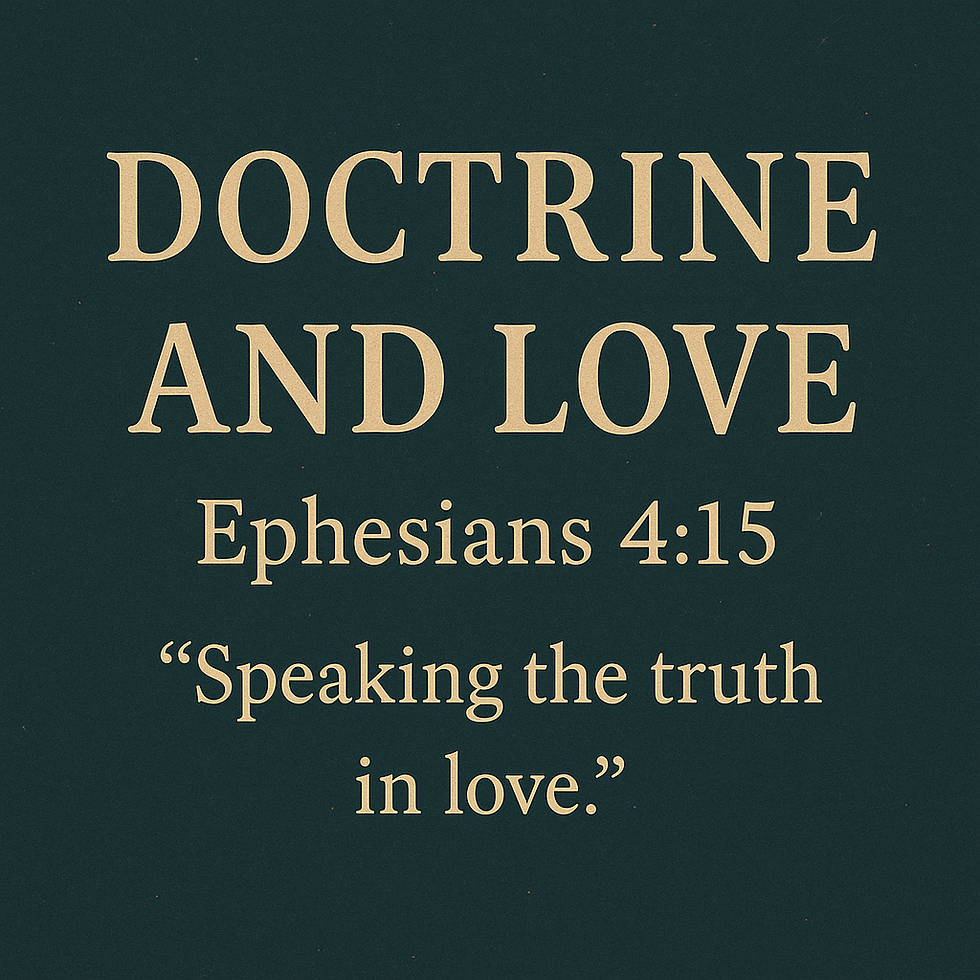Day 3: Doctrine Protects the Gospel
- Corby Davis
- Sep 6, 2025
- 3 min read
Scripture Reading:
“I marvel that you are so quickly deserting Him who called you by the grace of Christ for a different gospel, which is really not another, except that there are some who are disturbing you and want to distort the gospel of Christ. But even if we or an angel from heaven should proclaim to you a gospel contrary to what we proclaimed to you, let him be accursed.” – Galatians 1:6–8, LSB
The gospel is God’s good news: salvation by grace alone, through faith alone, in Christ alone. Yet from the very beginning, this message has been threatened by distortion. Paul was astonished at how quickly the Galatians were deserting the gospel for a counterfeit. His response is emphatic: there is no other gospel. Any alteration—no matter how appealing—destroys the very heart of salvation.
This is why doctrine is so vital. Doctrine protects the gospel. It serves as a guardrail, ensuring that the message of salvation remains pure and undiluted. Without doctrine, the gospel is vulnerable to human additions, cultural pressures, and satanic lies. With doctrine, the gospel stands firm, proclaimed clearly to every generation.
John Owen warned, “Errors are never so dangerous as when they are set off with the color of truth, and when they pretend to advance Christ and the gospel” (Works of John Owen, Vol. 9, p. 452). False teachers rarely present themselves as enemies of Christ. They often cloak their errors in the language of faith. This is why the church must be anchored in sound doctrine, lest she be carried away.
Consider how history bears this out. In the early church, debates over the deity of Christ threatened to obscure the gospel itself. The Council of Nicaea (AD 325) affirmed the biblical doctrine of Christ’s full divinity, protecting the truth that only the eternal Son could save sinners. In the Reformation, the rediscovery of justification by faith alone was not a minor point of debate but the very hinge of the gospel. Martin Luther rightly said it is the doctrine on which the church stands or falls.
Paul’s words in Galatians 1 show that distorting the gospel is not a small mistake—it is a damnable error. He declares that even if an apostle or angel preached another gospel, that messenger would stand under God’s curse. Doctrine, then, is not optional. It is life or death. As R.C. Sproul wrote, “Justification by faith alone is not simply one doctrine among many; it is the article upon which the church stands or falls” (Faith Alone, p. 19).
This same danger confronts the church today. Some add human works to the gospel, teaching that salvation requires rituals, penance, or moral achievement. Others subtract from the gospel, reducing it to positive thinking or social activism. Still others twist it into promises of health and wealth. In every case, the true gospel is obscured, and souls are left in peril.
Sound doctrine cuts through the fog. It insists that Christ alone saves, that His work is sufficient, and that grace cannot be earned. It proclaims that salvation is the gift of God, not the wage of man. Doctrine is the church’s shield, defending the truth of the cross against every counterfeit.
Beloved, do not be deceived: to guard doctrine is to guard the gospel itself. To grow careless about truth is to invite ruin. Let us therefore hold fast to the faithful Word, proclaim the one true gospel, and pass it on with clarity and courage. For as Jude exhorts, we are to “contend earnestly for the faith which was once for all handed down to the saints” (Jude 3).
Personal Reflection
Why does Paul speak so strongly about “another gospel” in Galatians 1:6-9?
How have false teachings throughout history threatened the purity of the gospel?
In what ways do modern distortions of the gospel resemble the Galatian error?
How can you personally help protect the gospel in your home, church, and community?



Comments